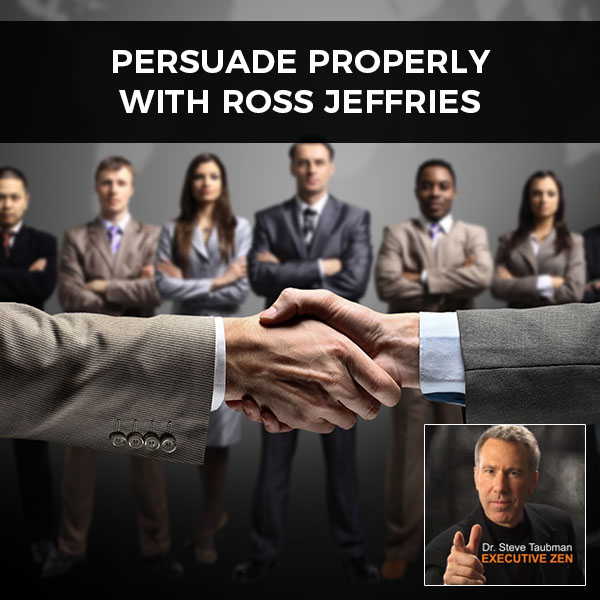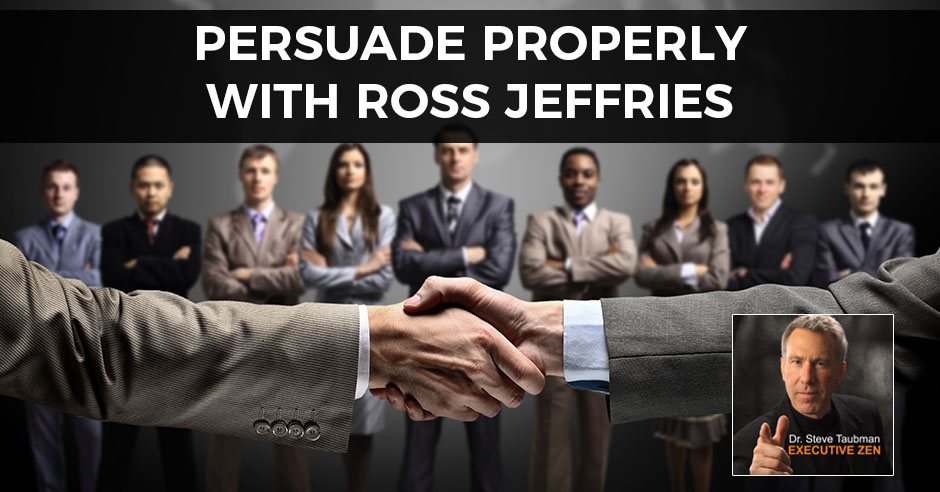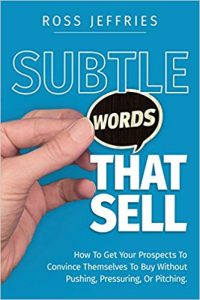

In this episode of Executive Zen, American Guru Ross Jeffries reveals little known secrets of the subconscious mind. Learn how to use language to persuade, empower, and heal. Great conversation!
—
Watch the episode here:
Listen to the podcast here:
Persuade Properly with Ross Jeffries
We’re going to be talking about persuasion and about language, about how we as human beings have the capacity to influence others in an ethical way through the way we choose to use our language. I got somebody who’s going to be joining me who’s got a lot to say on the topic, one of the world’s truly great leaders in that area. Coincidentally, we both discovered that he is on a registry of American gurus. We’ve got a legitimate American guru with us here. As most of you know, my work revolves around how we communicate with ourselves and how we communicate with others. My background in hypnosis and NLP are the tools or the foundation for which I’ve come to understand that we think in certain predictable ways. Whether we like to believe it or not, there are things that we can say that can influence others and things we can say that don’t influence others.
Likewise, there are things we say to ourselves that influence us or don’t influence us or demotivate us versus motivating us. The guy who’s going to be joining us here has some powerful tools to share with you if you happen to be in sales or in leadership. You want to be thinking about how your language might be inadvertently demotivating you, things you’re saying to yourself. This will be a great conversation to have. Ordinarily, I spend five minutes or so in preamble before I invite my guest. It so happens that the person I’m inviting in to join me now is a friend and somebody I admire and somebody who’s got a lot to say on the topic.

Subtle Words That Sell: How To Get Your Prospects To Convince Themselves To Buy Without Pushing, Pressuring Or Pitching
I don’t want to delay that process any longer. I’m going to introduce you to my guest and he is Ross Jeffries. For those of you who don’t know, Ross Jeffries is a master hypnotist, NLP trainer and an author. He has helped over 100,000 people realize the power of language to heal, to persuade, to influence and to turn their stumbling blocks into stepping stones. We’re going to be talking a little bit about Ross’ book which is called Subtle Words That Sell. It’s getting rave reviews on Amazon and I will definitely be encouraging you to take a look at that book for yourself. Without further ado, let me introduce you to the remarkable Ross Jeffries.
Steve, what an honor, a real pleasure and privilege to be speaking with you. You’re such a dear friend and it’s a rare treat because it’s not often I meet someone who I can learn from. I am in a position to be the teacher. It’s to meet someone who is a true friend I can learn from. Thank you for that wonderful introduction. I want to say hello to all the people out there whether you’ve listened to me, seen me, read my stuff or read about me before or not, I can promise you a great show. Before we jump into this exploration of what it is, you can stop and find yourself growing more and more fascinating about what it is you will be learning. I want to say it’s my privilege to be sharing that with you and with Dr. Steve.
I always feel like when we’re doing the work we do, we’re backstage and onstage at the same time. You’re communicating in a particular way as a way of helping people, but also what you are communicating about is the way you communicate. I’m going to invite you to share whatever you want to share about this process.
The first message that I want to communicate with people to be blatantly transparent is my mission is not necessarily what I state my mission to be. My stated mission is to help people to use language and this is my mission, to heal, to persuade, sell and all of that stuff. I’ve done that successfully for 30 years and I love doing it. My real hidden agenda is to get people to fall in love with language. I’m madly in love with my kitty cats and with my family and I’m equally madly in love with language. Do you remember when you were in grade school English class and they made you diagram sentences and you hated it? I’ve loved it. I don’t want to offend your audience but at that young age, I had a physiological response to doing it. I did not want to go to recess for that class and I loved it. I would diagram sentences for fun. I love language.
For your audience they may not know, have you ever heard of a Grimmerie? It’s a book of magical spells from the 11th, 12th, all the way to the 16th century. It comes from a Latin root word for grammar. Think of the word spell. We can spell our words but also spell refers to casting a curse or blessing on someone. Even in our language, you can see how we recognize the power of language making it akin to magic. All cultures have some myths about a god or demigod bringing the gift of language to humans. There’s recognition and myth and legend in our ancient language about how powerful language is. I’m in love with that. One of my careers for the past 30 years was, I still dabble a little bit, taking guys who could not get a date to save their lives. I’m teaching them how to shred all that shyness through how they learn to talk themselves in a different way and speak to women in a way that’s charming.
We’re talking nothing against these people. We’re talking about IT people and engineers, people who used to think in terms of data points. I told them, “If you can put it on a chart or a graph or prospectus or a blueprint, it’s not the kind of conversation that’s going to create an emotional and romantic interaction.” I teach them to change their language. I’ve seen this power also with my clients that I’ve been healing and with change work where it’s miraculous. I’m in love with it. The last thing I want to be doing in the last hour of the last day in this Earth is I want to be teaching and I want a 25-year-old smoking hot Swedish girl who’s in love with me sitting on my lap. Those are the two things that I want.
This is fascinating because most people think that if you’re shy, if you’re inept with the opposite sex that that is a very deep self-esteem issue. What I hear you suggesting is that just how you talk to yourself and others can have an impact on your outcome.
Let me tackle that in a different way. I don’t think there is such a thing as self-esteem. Self-esteem, as we know in NLP, is an example of a normalization. A normalization occurs when we take a verb, an activity and we freeze it and turn it into a noun. There’s no substance in your body called self-esteem. I used to say this in my seminars for guys who want more confidence with women. I would say to them, “I have a jug of confidence fluid up in my hotel room. It’s $500 a gallon. I’m going to drill a hole on the top of your head and pour a gallon in. Who’s in?” No hands went up. Confidence and self-esteem, they’re not things. They are activities, processes and also an interplay of skills, including having a great learning strategy to being capable of doing the activity, effectively learning and the ability to tolerate ambiguity and uncertainty. If we wait to be certain, if we wait to be confident before we take action, then we know very little is going to happen.
You know this from our mutual great teacher, Shinzen Young, the ability to have equanimity with uncomfortable emotions. Especially, Shinzen pointed out something. He said the number one problem, and I’m going to paraphrase him, “Humans hate confusion in the mind.” Confusion in the mind is discomfort in the body. Confusion in the mind is the very antithesis of the adult ego process. We want certainty. The ability to relate to uncertainty by the way we language it. I don’t do too many morning affirmations. I only do one and it’s this, “Uncertainty and confusion are my gateways to my clarity, my focus, my purpose and my vision.” If we could think from there, if you could take that process of being uncertain and confused, rather than looking at it as a block saying no, it’s a gateway to exactly what I need to go where I want to go in my life. What a transformation of language in there, that one little piece.
I also teach people three words. I want to share that three-word phrase with your audience. Neither of us are airy-fairy, woo-woo, “Your life is going to change and you’re going to manifest.” I want to strangle people who use that word manifest. I want to hang them upside down by their ankles. You know what I’m talking about. Sloppy, slovenly language offends me. With that said, if you have a self-limiting statement like, “I am lazy or I can’t make my outreach calls consistently,” don’t say, “I am a consistent caller or I am a success.” That’s stupid because, in a context, I’m speaking to you as a hypnotist. In a conflict between the conscious and unconscious mind, which one of those is going to win?
The subconscious always wins.
If we wait to be certain before we take action, then we know very little is going to happen. Click To TweetThe unconscious mind which you call subconscious is the same thing. It’s the same set of processes. If you say, “I am a powerful speaker,” there are a few things wrong with that. First of all, your unconscious mind has thousands of examples of you not being that and it’s going to know about that you’re not. We’re going to have an internal conflict. Why do people say a perfect person like me comes off as arrogant? I don’t know. You can now easily, quickly and naturally realize that I’m not making a guarantee here of success. If you put these words in front of it, if you say, “Up until now, I didn’t make my consistent calls. Up until now, I lack the skill of being a fun effective public speaker.” Those words, “Up until now,” are binding it in time. They’re saying, “I recognize I had a problem.” That removes the need to have a fight.
The second thing, you know this as a hypnotist, is the unconscious mind has no sense of time. The unconscious mind past, present and future happen all at once. This is part of the structure of a trauma. For the traumatized person, the trauma is happening right now. When we say up until now, we’re doing a couple of things, we’re binding that in time. We’re saying it’s in the past. Does that guarantee success? No, but it opens up the neurology. It opens up the neural pathways for a new possibility and the claiming of new skills and learning it. I didn’t say, “Up until now, I was a bad speaker and now I’m a great speaker.” I said, “Up until now, I did not have the skills of being a great speaker.” Now, I claim my learning of those skills. The mind works on repetition, familiarity and momentum. If we don’t give the mind a direction to go as far as acquiring skills and doing activities, we’re getting at no momentum.
What I’m hearing you say, and this is the sloppy language within which we all live, is that somewhere inside the deeper part of our mind, we’re repeating to ourselves over and over again, “I’m not good at this. I can’t do that. I’ll never achieve this. I’ll never achieve that.” That’s because the subconscious cannot distinguish between past, present and future. It’s all happening at the same time. There’s a quote I want you to share with us that you shared that blew my mind before but it’s germane here. It’s this idea that we’re basically reinforcing this reality that’s not really a reality. When you say, “Up until now,” you’re freezing it in time. This state of being has had reality up until now but it doesn’t have to continue to have reality.
Also with neuro-linguistic programming, we deal with a lot with the implication of language. Within that statement is the implication that it’s no longer the case and that it’s no longer has to be that way. Being very rigorous, I can’t claim that there is scientific evidence to show this but it’s a good guess on my part that you are opening new neural pathways. When you say, “Up until now,” you’re opening up pathways to learning. I do believe in this and I don’t believe we only use 9% of our brain, that’s a BS. How do you measure the percentages of the brain? That’s not what the study said. I know this because my sister, Marian, was the PhD candidate for Dr. Albert Mehrabian, who did that rat brain study. She compiled that research about 40 years ago. I do think biologically and scientifically it’s true. We have tens of millions of neurons and that means there’s too big a number for me to calculate certainly of possible neural pathways to generate new ways of thinking and new behaviors. That’s the scientific explanation for the power of the unconscious mind to do things.
I’m going to ask you to fill in the quote. It was the thing about when we repeat things to ourselves. We think we’re stating the truth when in fact, we’re reinforcing.

Language: People don’t need more confidence; they need a better learning strategy.
What I’m talking about is when we dwell on the mistake, the unconscious mind can’t tell the difference between what you dwell on and what you’re rehearsing and programming it back in to do it. When you dwell on the mistake, you’re not doing it because you self-sabotage or you had some trauma in your history or your mom called you stupid or you have low self-worth or any of that BS. You’re doing it and the intent of the behavior is to learn. When you dwell on a mistake, I would ask your audience, how many times have you had a screw up in your life and you dwell on it over and over about, “Why did I do that? What’s wrong with me?”
All you did was look at that error over and over again. Inadvertently without meaning to, you’re programming it right back in. Not because you’re a bad person but you have a crappy learning strategy. You don’t have a good strategy for learning. It’s no wonder if you repeat something and program it back into your mind, you’re doing that process. It’s no wonder that when you go out into the world, you’re going to do the same ineffective behavior or have the same ineffective response. There’s no mystery to it, you simply programmed it back in. People don’t need more confidence, they need a better learning strategy.
I make a mistake or let’s say I go out and give a talk and it doesn’t go the way I want it to. I’m ruminating about all the ways that I could have done differently, and I start feeling all those unpleasant uncomfortable feelings.
Here’s my formula. The first thing I do is I don’t go for the words negative, positive. They’re so sloppy. I don’t go from the very un-useful state to a super useful, “Yes” state. I get to neutral. I want neutrality first. I have crappy days, usually Mondays. I don’t try to get positive, happy and supercharged. I get to neutral. The way I get to neutral is I sit down and meditate. Without a meditation practice as a compliment or an integral part of your daily practice, you’re missing out. I meditate thirteen to twenty minutes daily. The great way to get to neutral is to meditate. I want to get to neutral. If you want to start programming in some better stuff or to look at a more dissociated way, I have a self-hypnosis practice. If you can learn to put yourself in a simple self-hypnotic state, it’s from there that you look in a dissociated way of what happened.
When a coaching client calls me, when we do a live video session or they drive down to San Diego, the first thing you look at is, “What did I do right? What worked?” We have such an orientation in our culture to look for it. What did you do right with your preparation? What did you do right with any of your behavior? What did you do right in terms of the way you did things sequentially? This is what we do in preparation. This is what we do in sequence. I watched you put on a masterful hypnosis show. It was so great. For those of you who don’t know, I had the honor, the privilege and the hilariously great pleasure of sharing the stage with Steve. Steve did a stage hypnosis show. When you do something excellent, Steve, you have a sequence. There was something you did to prepare but you have a sequence you follow throughout the show. When we do something excellent, we want to look at what was the sequence.
There are things you do at the beginning, middle and the end and then you probably do a little review after the end. I don’t know, at this point, you’re so masterful you don’t need to do that. There are things that we do, and I want to use a big word. There are no big words, only small minds or minds that have a lot to learn. Once you look at what you’ve done right, you ask yourself, “Where could I improve? Where is the room for improvement? It’s something I could have improved in my preparation, in what I did sequentially.” Then there’s also, how could you improve in your analogs? Analogs are any of the things that vary a longer range. You all had experience in the audience of having a light that had a dimmer switch. It wasn’t on or off. It can make the lights brighter or it can make the lights lower and then the switches are either on or off. In our behavior and the way in which we express, there are analogs. Analogs would be volume, I can be loud or I could repress and be quiet.
It could be a tone. I have a tone of voice that’s very deep and resonant. It could be something analog. Analog would also include your gestures, your posture because those vary a longer range. You look and say, “What could I have done better differently in terms of the actual words I’ve said? What were the words I said that I could have shifted?” There are a lot of different categories here that we could talk about but I’m just giving you a brief overview. My major point is we need a good learning strategy. Many people think they have a confidence issue. How many stops can you have throughout your day and how powerfully can you stop and imagine, “I want to keep learning with Ross and Dr. Steve because they offer so much value?” What action can you now find yourself taking as a result of your conclusion if it’s true? Did you notice me using any language patterns here, Steve?
No, not at all.
It gets in the way that I’m so smug about what I do but I am actually humbled by teaching skills because I see how it changes lives. We could talk about some of it. I said, “As you naturally, easily and powerfully.” These are adverb presuppositions. I didn’t say, “As you become aware.” There’s nothing wrong with that. I said, “As you naturally, easily and powerfully become aware.” These adverbs add power to that action that becomes aware and then I use presuppositions awareness, recognize, realize, know it is, become aware. That presupposes that what I say next is going to be true. How easily are you aware that Ross Jeffries is a genius? That presupposes that I am a genius. I also use a false profession of ignorance. I said, “I’m not sure,” which assumes again that the behavior is going to happen. It’s a matter of me not being able to know or be able to tell how or when it’s going to happen.
There are no big words, only small minds. Click To TweetThose are two things. It removes the idea that I’m a smug know-it-all, telling them what’s going to happen. More importantly, you need to listen to these folks. If you want to be a persuader that allows them to fill in the blanks and give the illusion that I understand, it gives the illusion that I’m an expert and an authority on their experience. At the same time, I’m letting them believe that they have full authorship of it all the while I’m dancing on my strengths or blazing a path if you prefer to think of it that way.
Talk about this in the context of sales.
One of the things I would like to get across is most salespeople are too specific right away, “Let me show you my marketing plan. As you can see, I’ve sold over 100 homes in your neighborhood over the last ten years. I’ve done it 30% quicker than the other agents from other brokerages.” People are going to go, “Yes, right.” I’m not saying there’s not a time and place to be specific but first I would be vague. I would say, “I don’t know what it is you look for when you stop and find yourself recognizing, ‘This is the agent that I want to hire.’ As that takes place, as we continue to share it together, can I ask one favor? Will you promise me one thing? Will you promise you’ll share the questions that naturally arise when that great decision is going to be made?” You see the artful use of language.
You’re presupposing that they have made that conclusion that they want to work with you.
I did something else. I use implied relationship verbs. I’d say, “As we share this process.” I said, “We share,” instead of, “I don’t know as I present this marketing plan to you.” What’s that ensuing? Sharing and exploring together and me presenting someone. When I present something to someone or something, I’m doing to them or at them, if we’re sharing an exploration, it implies a relationship. Do you share something of importance with someone you don’t trust or don’t have a relationship with?
I haven’t thought about that.
Later I say, “Will you make me one promise?” Do you make promises to people who you don’t know, that they intend to keep? I said, “Will you promise me you’ll share the questions that naturally arise when great decisions are going to be made?” What am I doing there hypnotically? Steve, you know this as a brilliant hypnotist. If there is a behavior, we know what the client is going to do. We incorporate it into the suggestions that we want them to take on as real. We know in the process of settling that client, that prospect, is going to ask questions. We may as well define the meaning for them of what asking questions means. I said, “Will you please share the questions that naturally occur when a great decision is going to be made?” I’m giving them a post-hypnotic suggestion that every time they raise their hand to ask a question, it means they are going to make a great decision. Not that they’re cynical or that they don’t believe me. Did you see the frame we’re setting there?
Yes, otherwise people tend to assume that they’re questioning. You, as a salesman, are often assuming that a question is an objection. Objection means the person is moving further away rather than closer to the decision.

Language: A good persuader gives the illusion of an expert.
When I hear an objection, I hear the sound of a checkbook being ripped out. I reframe objections. Twenty years ago, I had one of my dating coaching clients who’s pretty close. I took him to this restaurant where they had an outdoor area like a patio. I was trying to coach him, and he was uncoachable that night. After three or four hours of him striking out pretty badly and not listening, we went outside in the parking lot and waited for our taxi. I looked and saw a hot young woman standing ten feet away. I said, “There’s a lovely lady waiting for her cab.” I don’t know, for some reason, it went in the wrong way. She said, “There’s a filthy,” and she left with a stream of profanity to make a sailor blush. It included things about get relatives and me doing things that were anatomically impossible to myself. My student got very angry. He went to charge at her. He turned red in the face. He went to give her a piece of his mind. I close in I said, “No, she can come from wherever she wants. We decide how we respond.”
I turned and looked at her. I said, “She’s someone’s sister, she’s someone’s daughter, she’s someone’s best friend. Somewhere, she’s deeply loved.” That broke her pattern completely. I broke her pattern. She’s expecting me to yell at her or sneak away or apologize. I broke her pattern completely. She ran over, threw her arms around me and kissed me on the cheek. She said, “I’m so sorry,” she burst into tears. “That was the most beautiful thing I’ve ever heard, I’m so sorry for what I said.” The guy’s been crappy but saying the most profane things. “What’s your name?” I said, “Mr. Wonderful. Here’s our cab, goodbye.” The point of the story is I interrupted her pattern and I reframed the meaning of the conversation and the interaction. My thought that I want to give it is her first response.
One of the takeaways you ought to take away from that is I don’t take a prospect’s first response to me as objections written in stone. It’s only a reflection of what they’re thinking or believing at that moment, it’s subject to change. Her response to me wasn’t written in stone and it wasn’t about me. It was a reflection of the way she’d been treated badly. Because I didn’t take it and it wasn’t about me, I didn’t even make it about her. I didn’t say she’s a bitch or a terrible person. I thought here is a human being doing the activity called suffering, doing the activity called anger. Because I did not make it about her as a person or a character flaw, I saw the activity the flaw as our teacher would look at it. I was able to not take it as her first response which enabled me to interrupt her pattern, that was technique one. Technique two, reframe the meaning but that was only possible because I had the right perspective. This is why I say objections never take them as written in stone. They are only a reflection of that person’s thinking, feeling and believing at that moment. They are almost always subject to change.
If you don’t have that belief, then all the objection-busting techniques, including my own, won’t work as powerful. This is the difference between teachers. Unlike the other teachers, I teach the beliefs, the power and the techniques. Also, my stuff is not cliché. It’s different, you’ve never heard it before. You’ve never seen it before. It’s coming from outside the box. It’s coming from a different field than the sales field, even though I’ve been teaching now for quite some time. I’m using the stuff I’ve learned and I’ve taught guys. I’m coming from outside the field with a new perspective.
Before we even go there, before we even look at some of those strategies or techniques or the beliefs underlying them, the core belief that is underlying it is, “This isn’t about me. The question, the pushback, the anger isn’t about me.” Most of us live a very different way. If somebody throws negativity our way, we instantly justify our becoming negative in response to their negativity because who do they think they are? We never get to find out that there could have been another way. We never did get to find that out because we’re so reactive.
Never underestimate the power of the absurd and the ridiculous. Click To TweetI’ve learned this from my mom, but I had a woman who said to me, “You are interesting and unique.” I said, “What do you mean?” She said, “You listen and you deeply care about other people but you don’t give an F about what people think about you. It’s intimidating and it’s sexy.” That’s a great way for a decision service technician. They are decision service technicians because you’re never selling your real estate. You’re not selling your service. You’re selling decisions and good feelings about the decisions. The great attitude for you to adopt as a salesperson is you listen and care about the other person but you don’t give an F on what they think about you. It’s great. I’m not saying you’re arrogant. You can be very humble by not giving an F. It simply means you don’t take it personally. You care about the other person. You listen to what they’re saying and show that you’re listening. At the end of the day, you don’t give an F to what they think about you.
Maybe because that’s a transformative stance that most people have not made. I don’t even know that I’ve fully made it. I’m much less attached to the appreciation of others. I’m okay if people don’t like me but I still get those buttons pushed sometimes.
You have to look at everything I say in context. In the context of people I love and care for, my family, my friends, I care deeply about how people think about me because they’re my loved ones. They have great value to me and I bring value to them and I love them. I would take a bullet for them. For someone who doesn’t know you, someone in a sales situation, a client or a potential client prospect, you don’t know them. At the end the day, you don’t care. You want them to give you referrals, but do you let it rattle your sense of who you are? That’s absurd factually and it doesn’t make any sense. There’s nothing wrong with absurdity. Never underestimate the power of the absurd and the ridiculous but breakthrough absurd and ridiculous limitations and self-imposed barriers. In this case, it’s absurd in an un-useful way. They can be dropping these value bombs and little soundbites. I learned this during TV talk shows in the early ‘90s when I was provoking producers talking about how I’m the world’s greatest seducer.
I’m staying a little bit in this realm of business, in the realm of sales. A lot of people are entrepreneurs. A lot of people who work with us right now are entrepreneurs. They’re salespeople. They’re professionals. For many of us, our insecurity and our approval addiction can get in the way. What you’re suggesting, which is valid, is if I wasn’t affected by that and if I didn’t need people to love me, then I could be very precise in my language. I could be very non-reactive when somebody comes at me with negativity because what’s the big deal?
I don’t even see negativity, I see the response. Any response they give me is information I can use or momentum. Anything they give me is momentum I can redirect. Think of Tai Chi or Aikido. When you take their momentum, turn it around and use it against them or the way you want them to go, I think it’s that. Let me be clear, if someone I love and care about is angry at me, then I care but I refuse to accept the label. If someone starts calling me names, “You’re an idiot, you’re a jerk,” I stop them. I say, “Stop, the more you name call me and the louder your volume, the less I can hear you.” Point out the behaviors you don’t like and ask me for what you want, not for what you want me to stop doing. Nine times out of ten, I’ll give you that gracefully and gladly. I either only associate closely with people who already know that skill or who are willing to take it on. If they’re not willing to take it on or can’t get there, then they don’t get close to me, they don’t get into my inner circle. I cut them off. It’s a good thing for business, it’s a good rule for business.
Although in businesses, you’re going to confront people who may not be the kind of people you want to have to be sharing your family dinner with.

Language: You can be very humble by not giving an F.
That’s fine. Use the pattern interrupt. One of the things I’ll do, the angrier a person gets, I call it spocking after Mr. Spock from Star Trek. He’s the guy who was always cool and never showed emotions. The angrier the person gets, the calmer and quieter I get. If they’re letting me into something, I’ll say, “I’m sorry. I’m not getting your point. What are you trying to say?” They’ll get angrier and angrier and I’ll say, “I’m sorry. I’m still not getting you. What do you mean?” If they tell me, “Go shove your so and so,” I’ll say, “How do I do that?” Finally, they punch themselves out and they get exhausted. I said, “Now, it’s clear you’re done. Let’s talk in a calmer way,” and they’re already exhausted.
I learned that skill a long time ago also. I feel like you need to let people run out of their own steam before you can have any rational conversation with them.
There’s a point at which I wouldn’t do that, like if someone fender bended me. I took a training. I knew the trainer was going to confront me because I wasn’t a little lamb bleating like all the other little sheep. I had the temerity to stand up during the process and say, “You’re coercing her, this is too much.” The head trainer went like this to me at lunchtime and said, “Come here.” I said, “I don’t respond to this. What is this?” He got my face this close. I said, “Step back. You’re too close.” I put my arm out and I took a step back. I said, “I don’t accept people being that close to me.” If someone is bringing anger with you and they’re in your danger zone, they’re in striking range or kicking rage and you’re in a place where you’re not physically safe, that’s a different story. I do take it personally because that person is showing me all the signs that they are an actual physical threat, that’s a completely different thing. Then it’s appropriate to have the right reaction and the right response. That doesn’t deserve to lose your thing.
What we’ve been talking about is not reactivity, which from a Zen standpoint is the ability to stand your ground to be affirming your own space in whatever way you need to. Then to take your centered being, that you’re not thrown off course, that you’re center. You now have the power. You now have a capacity to respond in a useful way. Like in the story about the woman, you were not triggered. You stayed centered and then you were able to respond in a useful way which would produce results. Bringing that back to business, let’s go to objections.
I have many tools. Let me give you a tool called counter-examples. Many times, many salespeople, no matter what their field may be, they hear the objection, “I need more time to think it over.” I know they’ll hear that. I can’t talk with people watching but I know you’ll hear. I teach many techniques but one of the ones I enjoy very much is the counter-example. The bad thing to say is, “Why do you need to think it over?” That gives them more reasons to think it over. Have you ever taken a long time to think something over and it still turned out to be the wrong decision? That’s a big pattern interrupt and it’s a universal experience. Who hasn’t had that experience? Right then and there, suddenly you’re stopping them dead in their tracks. That gives you the opportunity to reframe the meaning. Then you will say, “Maybe it’s not about time but about the clarity you need to recognize a great decision is going to be made.” I made it about clarity. Once I made it about clarity, I can get the discussion going again and put it out there on the table, so I can find out what the real issue is. That’s an example of a counter-example. That’s one technique. There are many others.
I’d like you to share a little bit about your book.
I have a wonderful book called Subtle Words That Sell. I first tried writing something along those lines in 2006 but it didn’t jell for me and my mind didn’t represent my full excellence. I gave it a shot in 2013. I thought I’ll finish this by the end of 2016 and then, sure enough, I finished it at the end of 2017. It came out in March 2018. You can pick it up on Amazon. Go ahead and grab it. You’re going to love it.
It’s a great book because it’s filled with a lot of these kinds of things, language patterns and ways of reframing some of the objections you might get, but also pieces about how we speak to ourselves.
When we do something excellent, we want to look at what was the sequence. Click To TweetThere’s a whole section on mindset and everyone talks about mindset. I have a unique perspective. I’ve dealt with guys. In my courses, there are 30, 40, 50-year-old virgins. I can change their mindset so they have the practice of confidence. They’re able to handle no because the guy is a 50-year-old and has never had a date. As he goes into the world to practice brand-new skills, he’s going to hear no a lot. If I can teach them, I can take any sales person with even an iota, a little atomic particle of skill and teach them how to handle hearing noes and turn those noes to, “Yes, please. When? Can we do it right now?”

Language: You need to let people run out of their own steam before you can have any rational conversation with them.
I’ve seen you share this stuff on stage and rock it. There are some fabulous discussions about this and that’s well-worth spending a little time studying this. If you’re trying to excel as a salesperson as a leader as a parent because you and I both know sales is not just transaction of money for goods. Sales is persuasion. Sales is how we influence somebody’s thought process in somebody’s decision-making through our language. There are a couple of things I want to do and one of them is I want to remind my guests that if you’re interested, you can take advantage of the sample of my book which is Buddha in The Trenches. I’ve got SteveTaubman.com/Jenny. Go ahead and grab yourself a free copy of an initial couple of chapters of the book and definitely check out Ross’ book online.
As we end the episode, I’ve always got a metaphor, a quote and a challenge. I usually leave the challenge to my guests. I’ll ask Ross to throw something our way in terms of the challenge. What I was thinking about as a metaphor for what we’re talking about here is the game Tetris. How we communicate is like Tetris. It’s like we’ve got this block of information, a block of influence but how do we need to spin it in order to get it to fit into a pre-existing slot? Where’s the slot that goes into? In the listening ear of our clients. Think about that a little bit. Think about this Tetris idea. Is it possible that that same idea can either land or not land depending on how you move it or how you turn it? That’s my metaphor for us to consider. As you’re communicating with people, think about what you need to do to spin turn that message in a way that fits into a place where it might be received. Thinking where is it going to dock? Where is it going to fit in? My quote for the day is from Aesop’s Fables. He said, “Persuasion is often more effectual than force.” With that, Ross, I’d love to have you share a challenge with our guests.
I would challenge you all to monitor your language. When you find your self-limiting statement coming up, stick the words, “Up until now,” in front of it and note the difference it makes and the felt the sensation in your body and the sense in your mind that you can open to doing possibilities.
It’s been great talking to you, Ross. I appreciate your time. Remember to lead consciously and profit responsibly. Take care.
Important Links:
About Ross Jeffries

Ross Jeffries is a master hypnotist, NLP trainer and author who has helped over 100,000 people realized the power of language to heal, persuade, influence and turn their stumbling blocks into stepping stones. His book, Subtle Words That Sell is getting rave reviews on Amazon.